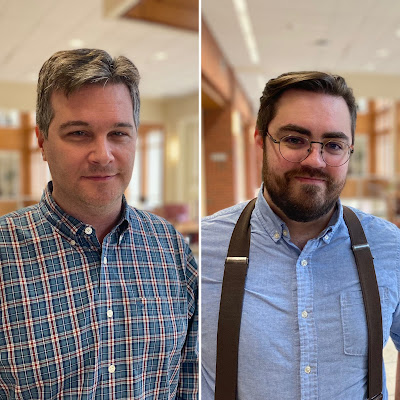Student researches a treatment

By Doris Wedge
The Norman Transcript
August 30, 2010
NORMAN — An e-mail to an instructor at Michigan Technological University opened a door to an opportunity for Brent Van Rite on the OU campus, an opportunity which will lead to a doctorate and might play a big role in the treatment of solid tumor cancers.
Van Rite was nearing graduation from MTU with a degree in bio-medical engineering when his path took an unexpected turn.
“I was on the wait list at two pharmacy schools,” Van Rite recalls, and he had nothing to lose in responding to the e-mail from Dr. Roger Harrison at the University of Oklahoma.
The professor of chemical, biological and materials engineering was looking for a student who would be interested in entering a doctoral program. Harrison had a “carrot” to offer the right applicant: the chance to work with the professor as a graduate assistant in his research project looking for a breakthrough in the treatment of solid tumor cancers.
Van Rite had taken a course that had touched on drug delivery in the body, “and it was very interesting to me,” said the young man, who describes himself as “always interested in science and math.”
His response to Harrison resulted in an invitation to visit the OU campus. By the end of the visit, in spring 2008, Harrison had offered Van Rite the chance to study and work with him in his research funded through a contract with the Department of Defense.
Ensconced in a lab in a lower level of Sarkeys Energy Center, his desk is his “office.” His world as a graduate assistant is centered in three labs, including one in Oklahoma City. “I am here seven days a week,” Van Rite said.
It is there that his work focuses on utilizing enzymes to react with a non-toxic pro-drug, which can be localized in a tumor. Once in the tumor, they hypothesize, the pro-drug will be converted to a toxic drug.
“The difference with this approach is that the drug would treat only the tumor,” he explained. “Whereas, chemotherapy kills healthy cells, as well as the malignant cells.”
This has enormous implications for any solid tumor form of cancer, but their research is focused on breast cancer.
His work thus far has been “in vitro” testing, meaning testing outside a living organism. The next phase is to work with lab mice, testing that is called “in vivo.” In a lab at the OU Health Sciences Center, he will induce breast cancer in the mice and then see if the treatment of the tumors works.
“I will work with mice that do not have an immune system, so they have to be kept in a sterile environment,” Van Rite said.
The labs on the Norman campus don’t provide that kind of environment for the mice, he said. All of the testing using mice has the approval of the IACUC, the Institutional Animal Care and Use Committee.
Assuming that the treatment will work, further tests will determine the level of toxicity needed to produce positive results.
While other graduate assistants have worked on the project before him, flaws were found which required him to start from scratch, work that he has documented in a paper he and Dr. Harrison hope will soon be published.
“All of the in vitro data set to be published, I have done myself,” he said.
Van Rite grew up in Green Bay, Wisconsin, and found Oklahoma to be “polar opposite” in many respects, “but it was a welcome change.” Raised in the family-owned construction business, he said his parents have worked hard to see their three children get college educations. His twin sister, Brittany, soon will finish her juris doctorate and another sister, Tiffany, has a bachelor’s degree and works in the health insurance industry.
Remarking about working in the lab seven days a week, Van Rite said, “I got my work ethic from my Dad,” who started the construction business when he was just out of high school. But the younger Van Rite finds time occasionally to golf at the Westwood or Jimmie Austin courses, playing with a single digit handicap.
Van Rite is halfway through his doctoral studies and has the research project to complete, so he anticipates being on the OU campus for at least another two years. After that, he might pursue post-doctorate work.
“I would like more experience, more hands-on research,” Van Rite said.
He is likely to eventually find a position related to the pharmacy education that he is planning on when he got his bachelor’s degree, this time in research for a pharmaceutical company.
“I would like to stay in cancer research. Cancer is taking lives left and right. With our research, we are going for a treatment. Looking for a cure would be a whole other ballgame,” Van Rite said.
As for now, he can only wonder where the results of the research he is involved in may lead him.


